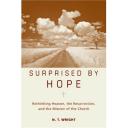N.T. Wright’s recent visit to Nashville, TN, included an interview with the Tennessean. It includes some very interesting comments regarding hell and the final state of those who reject God’s Glory and Gospel. While I do not share his views on hell in full, I would say that his heart to see the world renewed is a blessed hope and central teaching of the Bible that we should all think about regularly and share with our family and friends. Below I have reproduced the article found here:
————————————-
Bishop bucks views of heaven
Long-held notions not biblical, he says
By BOB SMIETANA
Staff Writer
Heaven is not retirement on steroids, where people sit around doing whatever they like, with nothing but time on their hands.
Instead it’s more like going on vacation. You rest, relax, stop and smell the roses, and then get back to work. At least, that’s what the Bible says.
“The book of Revelation talks about God making us kings and priests,” said N.T. Wright, bishop of Durham, England, and author of Surprised by Hope: Rethinking Heaven, Resurrection, and the Mission of the Church. “It isn’t just salvation and now you can sit back and relax. It’s that we are saved to be God’s agents and stewards in this new creation.”
Wright who was in Nashville on Tuesday speaking at West End United Methodist Church, believes the notion of going to heaven after death isn’t found in the Bible. Instead, he says, God brings heaven to earth.
“It’s like this world with all the beauty and the grandeur and the power,” he said, “but unfettered by death and decay.”
The Church of England bishop says that he isn’t trying to come up with a new or inventive view of heaven and resurrection. Instead, he is trying to point people to the Bible.
“The odd thing is that I don’t think I am saying anything remotely unorthodox,” he said. “I am trying to give people back some bits of the Bible they have forgotten about … Resurrection may be crazy, but it is what Christians are supposed to believe.”
That’s a notion that appeals to Scotty Smith, founding pastor of Christ Community Church in Franklin. Smith is currently preaching a series on heaven based on the book of Revelation.
He says that evangelical Christians, in particular, have replaced a biblical view of heaven with a romanticized view.
“It (heaven) is going to look a little more like this world than a place filled with cherubs sitting around and singing Bill Gaither songs,” Smith said. “The story the Bible tells is one of redemption, not replacement.”
Resurrection is the focus
Wright, appointed bishop of Durham, a diocese south of Scotland, in 2003, says the Bible and the Christian creeds speak more about resurrection than about going to heaven.
“Without resurrection you are left with a theology which says that the present world of space, time and matter is just junk, and God is going to throw it in the trash,” he said. “If you say this world is basically junk and trash, you can exploit it, you can exploit people. You can abuse the world, and you can abuse people and it really doesn’t matter.”
This focus on resurrection and not just getting to heaven also appeals to Gavin Richardson, director of youth ministries at Faith United Methodist Church in Hendersonville.
“It’s not just ‘get Jesus and you are good to go’,” he said.
In all his talk of heaven, Wright still believes in the reality of hell. He says that, in the end, people are free to choose to be separated from God.
“The Bible doesn’t talk about heaven and hell side by side. The Bible talks about God bringing all things on heaven and earth together. Heaven and earth will be joined. That is the great renewal and God’s victory over evil and suffering and death,” he said. “At the same time, the Bible talks about the certainty of final loss for those who choose not to worship the God in whose image they were made. And it seems to me that the New Testament doesn’t leave us with the option of saying all will be saved. I often wish it did, but it doesn’t.”



